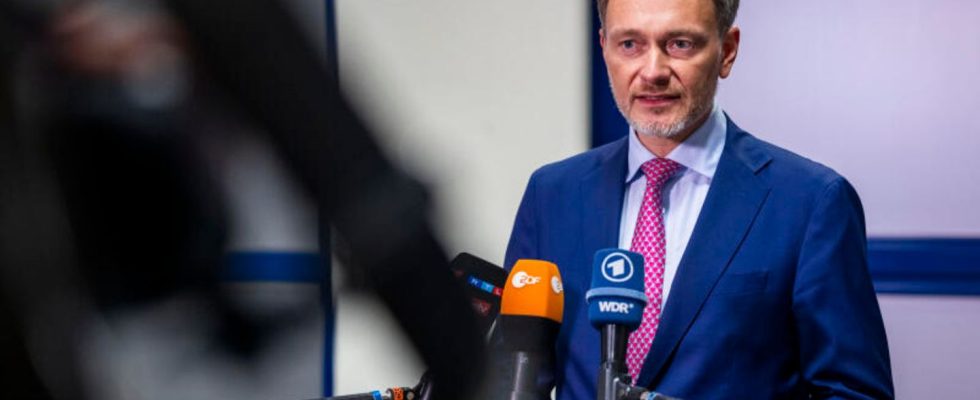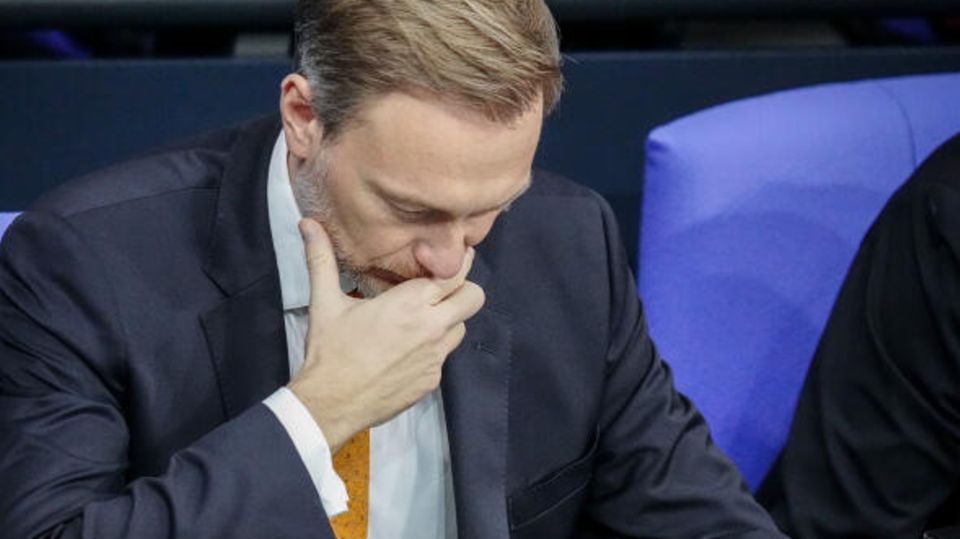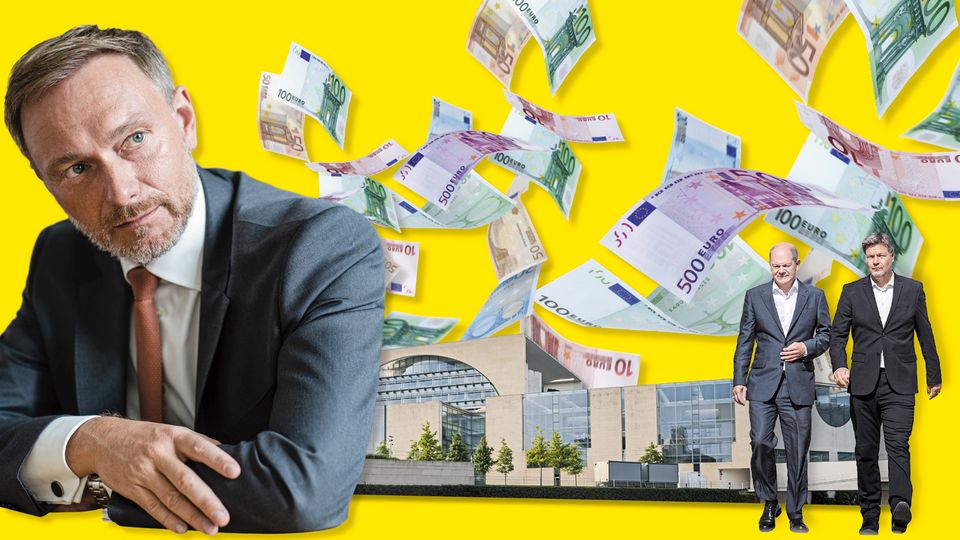Are we thinking in a new way? No, better not! The FDP swallows its frustration with the traffic lights. But doesn’t the leadership also have its share in the tricky situation?
At a time more than ten years ago when the FDP and the Union were in mutual dislike in the federal government, Hans-Dietrich Genscher once said: “For me, liberality also includes the ability to constantly question what we see as have considered established knowledge.”
Even today, at a time when the SPD, Greens and FDP are in mutual disfavor with each other in the federal government, that sounds like a sensible New Year’s resolution for Genscher’s successor in the Liberals. In theory. In practice, it looks as if no one in the FDP leadership currently remembers this principle of the former Foreign Minister and Vice Chancellor, who died in 2016.
The liberals definitely have a reason to question some things anew. At the beginning of the week the results of a member survey were released, in which just over a third of party members took part. Should the FDP end its work in the traffic light coalition with the SPD and the Greens? Only 52 percent voted for it. A very close result. It could be the impulse to implement an old FDP motto at the traditional Epiphany kick-off on Saturday in Stuttgart. It could.
Are we thinking in a new way? No, better not!
The FDP really doesn’t have it easy
The confirmed knowledge of the party leadership does not correct the result of the survey – at least not yet publicly noticeable. That is: The liberal signature of the FDP in the government must become more visible. That’s a phrase that leading liberals have said about as often in the past year as Olaf Scholz said “Thank you for your question.” Far too often.
At this point, even if it may come as a surprise, we have to briefly defend the FDP leadership. Party leader Christian Lindner and his general secretary Bijan Djir-Sarai, parliamentary group leader Christian Dürr and his young deputies – they all certainly don’t have it easy. This is rightly not a category in politics, but that is why it is quickly forgotten.
For the FDP, the situation in a federal government has never been so challenging. It must highlight its own successes, including its share of overall successes – without immediately running the risk of being held jointly liable by its own supporters for every slip-up statement made by some Green politician (usually Robert Habeck).
In terms of content, the Liberals depend on the success of the traffic light coalition. Culturally, they must remain foreign to her.
The FDP is not to be envied for the demands of its supporters
And here the FDP grandees have to be released from protection again. No matter how demanding the situation may be, Lindner and Co need to dare to be more courageous, even if that may sound as cliché as the sentence with the liberal handwriting. It’s about a question that those responsible in the Hans Dietrich Genscher House can no longer avoid: what part do they themselves have in the fact that the FDP’s government work is so hated by a part of their party that is large enough that you can’t ignore him?
Yes, the truth is that no one envies the FDP for its supporters. With their pragmatism about governing, they are not as easily convinced of compromises as Union supporters. And they are hardly receptive to emotional “We all love each other” calendar slogans, which the Greens have recently been able to pacify at party conferences.
Convinced grassroots liberals are more like the constantly complaining Social Democrats of the 2010s. Comrades back then: Minimum wage? Yes, it’s great that we were able to prevail, but far too small. Liberals today: Tax relief: Yes, it’s great that we were able to get through this, but far too little.
But the bad mood can hardly be due to the general state of mind of the base alone. Is what the FDP is pushing through simply not enough? Or does she talk down the traffic lights so badly that her own successes don’t come through?
If you look at it soberly, every FDP voter in 2021 got a lot for their cross. There is more liberal programming in the traffic light laws than one would expect for the 11.5 percent election result. Planning acceleration? Own ideas largely enforced. Citizens’ money? Widely enforced. Cold progression? Enforced. Heating law? More than enforced. Bubatz? Soon legal.
In addition, there are the SPD and Greens’ proposals for tax increases and the debt brake, which are not in the coalition agreement, but which the FDP still has to defend against every day – with success.
The problem with all the successes in terms of content: They meet the minimum of what the critical base already expects from their FDP. The compulsory task is rarely followed by the freestyle. But that is exactly where the difference lies in political communication: Without us it would be much worse. And: things are going much better for us.
No wonder you only hear the former from the FDP. The liberals have walled themselves in institutionally. Admittedly, one could say: They had little choice.
Christian Lindner had to forgo traditional liberal winning topics
When Lindner was able to choose a ministry in 2021, he chose the Ministry of Finance. This is easy to understand given the lessons of black and yellow in the amusing but unsuccessful period from 2009 to 2013. At the same time, however, it was a departure from a long liberal tradition of foreign policy avant-garde. Genscher, again!
In order to ensure the FDP’s survival in the traffic lights, Lindner had to forego the traditional liberal winning fields in the traffic lights. This also applies to the Ministry of Economic Affairs. Otto Graf Lambsdorff, anyone? To date, the Liberals have not succeeded in prominently filling this important field of care for the market economy and small and medium-sized businesses. Or would you know who has been the economic policy spokesman for the FDP parliamentary group for six years? Even.
Transport and digital, education and research, justice. These are the three other departments of the FDP – each with its own problems in terms of effectiveness. Whether Volker Wissing has successfully renewed the railway’s infrastructure will only become clear in a few years. Transport policy is – if it is not just pursued for Bavaria – a very long-term matter. This also applies to research. Education policy remains primarily a state matter. A year ago on Epiphany, Lindner announced a billion euros for education. What happened to it? Good question.
Why not get really excited about the future again?
Justice Minister Marco Buschmann is diligently drafting laws and working diligently to ensure that this does not remain hidden from the public. In his department you can find it, the freestyle of liberal government policy. Naming rights, self-determination law, citizenship reform. The only question here is: Who is the freestyle actually for?
Let’s take citizenship law, where it sometimes seems as if the FDP had to prevent any left-wing dreams again. Their own election program contained more progressive goals than the government’s decision. The cautious communication of one’s own successes in modernizing society is a concession to that part of the base that one particularly wants to ensnare and certainly not lose to Friedrich Merz and the Union: the conservative-liberal core voters (gender not necessary).
This doesn’t have to be the wrong strategy if you want to get back into the Bundestag in 2025. This is certainly the wrong strategy if the FDP wants to achieve a double-digit result again.
Will we reach more progressive liberals if Lindner and Djir-Sarai only talk nicely about the traffic lights from now on? Hardly likely. There will be no easy answers to the questions facing the FDP this year. But why not celebrate the successes with citizenship and the self-determination law even more aggressively? Why not give a proper internal contra to those for whom this is new liberal territory? When it comes to education and digitalization, why not reflect on what the Lindner-FDP once did successfully with first-time voters: keen on the future. At the moment it feels more like: Hopefully the government’s present will be over soon.
Of course, a communicative pivot would be associated with risks. But Hans-Dietrich and Otto’s heirs will have to put in a little more effort in 2024.



